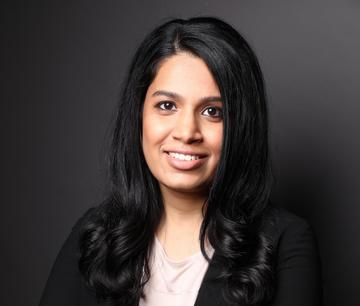Sushma Shankar, co-founder of Deep Planet

Sushma is the Co-Founder of Deep Planet. Deep Planet aims to help agricultural businesses, companies and growers to learn and adapt from new insights using satellite data while supporting sustainability in their operations. The company is currently (as of early Dec 2023) 40 people strong and growing.
Sushma started Deep Planet at Oxford during her MBA, specifically on the Global Opportunities and Threats programme and the Entrepreneurship Project. The theme of the year of this Said Business School programme was Global Water Security. From the programme, Sushma and two of her peers (the co-founders of Deep Planet) developed a project that sought to assess and address environmental risk through the use of satellite imagery. Thus, the Said Business School provided the launchpad for the idea, which subsequently grew into a company with the emergence of investors (particularly the European Space Agency) and a growing number of interested parties.
Sushma holds an MBA from Oxford University, St Catherine’s College (UK), Masters in Computer Engineering from Illinois Tech (USA) and bachelor's degree in software engineering from Visveswaraya Technological University in India.

I bring 15 years of experience in innovation and technology to business. My background is in Research & Development and Business in the telecoms industry, where I played a key role in launching 4G to millions of users, leading business planning, and overseeing large-scale transformation at BT, Hitachi, and Nortel Networks. My trajectory towards entrepreneurship was not initially driven by a primary motivation to become an entrepreneur. Undertaking the Oxford MBA, my goals were to connect with new people and explore diverse industries. The transition to entrepreneurship emerged through my participation in the Global Opportunities and Threats program at the Said Business School.
Entrepreneurship is creating innovative ideas that positively impact people and the planet.
Through extensive research and discussions with individuals across various industries (including banking, finance, and oil and gas), the Deep Planet team identified the practical applications of the idea and the areas where it could have a significant impact and added value. Agriculture emerged as a key sector where the technology could complement existing tools. Following the development of the proof of concept, they garnered considerable interest, particularly from farmers in the wine industry and other agricultural clients seeking insights into soil and weather conditions for their products. Deep Planet is particularly relevant in the face of climate change, where traditional methods and knowledge transmission have become inadequate. Farmers are now compelled to embrace new technologies to gain understanding about optimal harvest times, yield optimization, and prevailing water conditions. Deep Planet emerged as a solution that addresses these pressing needs.
At first, it’s the openness to new ideas and opportunities. The entrepreneurial journey is marked by constant evolution and the need to innovate. Entrepreneurs need to be open to new ideas and opportunities to develop their products and understand changing market dynamics.
Second is continuous learning. The business landscape is ever-changing, and successful entrepreneurs embrace a mindset of continuous learning. Entrepreneurs should stay informed about industry trends, emerging technologies, and evolving market dynamics to make informed decisions and adapt their strategies accordingly. Furthermore, continuous learning fosters innovation within the business and helps entrepreneurs stay ahead of the competition by leveraging new knowledge and skills.
And last but not least is hard work and dedication. Successful entrepreneurs are dedicated and hard working for these skills serve as the foundation for overcoming challenges, persisting through failures, and achieving long-term goals.
I love creating something that has a positive impact! I also enjoy creating and building a great working environment with a team full of brilliant and humble people!
I love having the opportunity to take an idea and inspire other people around me to contribute to that idea, make it better and put it into action. The risk and uncertainty of running a business is stressful, however, when it comes down to it, success is sweeter when you were the one to take the risks.
The most satisfying moment is hearing our customers tell us how we have changed their lives and impacted their business. It’s enormously satisfying to hear how critical we are to our customers’ business and think “Against incredible odds, we did that”.
As an entrepreneur, I have learnt that hiring is critical for the business and also where mistakes happen. A bad hiring decision could make or break the business. Hiring the wrong people at an early stage of the company can not only derail the business but also take up the limited available resources.
Deep Planet was initially funded by the European Space Agency, but has raised additional funds from a diverse body of investors and grant agencies
Depending on the business idea and stage of the business I would direct them to different support networks (Said Entrepreneurship Center, Creative Destruction Labs, and funding bodies (University grants, Innovate UK, angel investor networks, VC funds).
Work hard. Stand up and get your work noticed. Support others, and remember: small steps are important!
As a woman entrepreneur, you face daily challenges across various fronts. From encounters in meetings where your voice and contributions might receive less attention and recognition compared to your male counterparts, to navigating funding avenues where the odds of investment may be lower for women. You must work ten times harder and stand up to what your future self would want you to be, even if that means you must fake it until you make it!
I would recommend they join the many female-founder friendly programs and find your peer female founder networks. There are others going through the same journey and their experiences and insights can help you.
The University of Oxford should continue their good work with EnSpire IDEA, and continue to promote group platforms for women to learn from other Oxford women entrepreneurs. The University of Oxford can also aim to make more funding resources available to women entrepreneurs.
For aspiring women entrepreneurs, my top recommendation is to actively engage in networking and relationship-building and to be vocal about their accomplishments. Establishing connections is crucial for entrepreneurial success. Through network building you will discover potential collaborators, mentors, and customers. Networking also provides valuable insights into investors, market trends, customer requirements, and industry best practices which can empower women entrepreneurs to make informed decisions and expand their professional circles.



